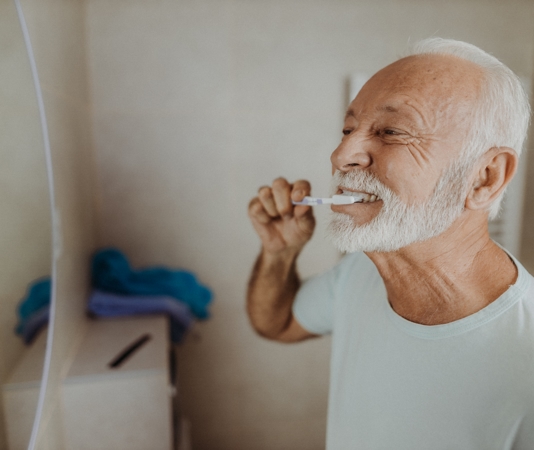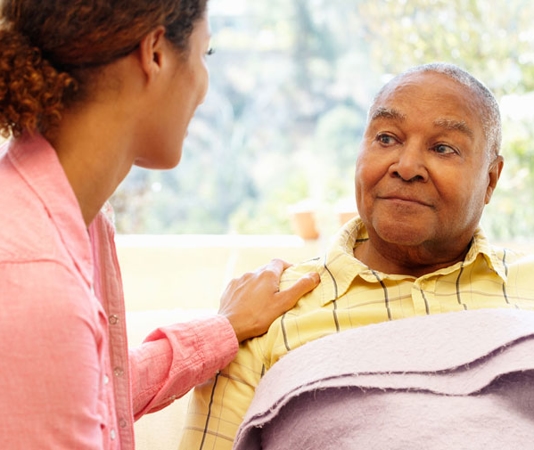It has been known for years that people who have Alzheimer’s disease have disrupted sleep, but recently researchers examined a connection between poor sleep and the onset and progression of the disease.
Researchers at the Johns Hopkins Bloomberg School of Public Health led a study that looked at the association between sleep variables and a biomarker for Alzheimer’s in older adults. The results, featured in JAMA Neurology in October, found that in a group of adults over age 70, those who slept for shorter amounts of time and had poor sleep quality also had higher levels of Beta amyloid, a brain plaque that is an indicator of Alzheimer’s.
Good Sleep and Alzheimer's
Although further study is needed to determine whether poor sleep contributes to or accelerates Alzheimer’s, experts agree that a good night’s sleep has many health benefits and people are not getting enough sleep these days—especially those who have the added responsibilities of being a family caregiver.
“Centers for Disease Control data shows that 37 percent of U.S. adults sleep less than the recommended minimum seven hours of sleep per night on weekday or work nights,” said Dr. Nathaniel Watson, MD, who serves on the board of directors for the American Academy of Sleep Medicine (AASM). He is an associate professor of neurology at the University of Washington in Seattle and co-director of the University of Washington Medicine Sleep Center.
This chronic lack of sleep for roughly a third of the population is the subject of a section of the popular Huffington Post online newspaper and a three-part series, “Advice About Sleep Deficiency in Midlife” in The New York Times. The bottom line: people need more quality sleep to improve their health and overall well-being at every age and stage of life.
The National Sleep Foundation states on their website: “Studies have found a relationship between the quantity and quality of one's sleep and many health problems. For example, insufficient sleep affects growth hormone secretion that is linked to obesity; as the amount of hormone secretion decreases, the chance for weight gain increases. Blood pressure usually falls during the sleep cycle, however, interrupted sleep can adversely affect this normal decline, leading to hypertension and cardiovascular problems. Research has also shown that insufficient sleep impairs the body's ability to use insulin, which can lead to the onset of diabetes. More and more scientific studies are showing correlations between poor and insufficient sleep and disease.”
Our connected world may be one cause of poor sleep. “Sleep deprivation in our society can be contributed to many factors including the media we constantly consume and our 24-hour economy,” said Dr. Watson. “We have all types of media at our fingertips these days – from hundreds of TV channels to our computers and smartphones. Overuse of these mediums can lead to sleep deprivation, as well as difficulty falling asleep due to exposure to the light they emit that is signaling to your body that it’s time to be awake.” (For those who can’t put down the gadgets, see our December blog post about apps for caregiving, including some which claim to assist with relaxation and possibly sleep.)
In addition, family caregivers can miss a great deal of sleep due to their responsibilities of caring for someone else—especially for people who may be getting up often at night.
“Family caregivers can benefit from sleep in the most basic sense because they will be more energetic and alert during the waking hours to keep a sharp eye on the person they’re caring for and be able to keep up with the often strenuous tasks that caregivers undertake,” said Dr. Watson.
The rule of thumb for the amount of sleep needed for adults, according to the National Sleep Foundation, is about seven to nine hours. However, individuals need to assess their own sleep needs and habits.
Sleep Tips
For an optimum night’s sleep, Dr. Watson recommends:
- Exposure to as much daylight as possible during the day, and as much darkness as possible during the night.
- Have consistent bedtimes, wake times, and meal times, and socializing time.
- Try to avoid psychotropic medications that may cause disorientation at night (for caregivers, it is recommended that the person they are caring for avoid these medications, if possible).
In general, the National Sleep Foundation suggests that people get regular exercise, avoid caffeine close to bedtime and use the bedroom for sleep and sex only (no TV or computer in the bedroom).
When a person has been losing sleep over an extended period of time—such as providing additional care for a loved one—it can take time to feel rested again and learn how to get good sleep again.
“There is a myth that people can catch up on sleep on the weekends, but it takes more than two days to get back to a rested state,” said Dr. Watson, noting that suddenly sleeping longer hours after a period of sleeping just a few hours does not automatically shift the circadian rhythms.
For those trying to establish good sleep patterns after a significant sleep loss, or for the first time, Dr. Watson said that they need to establish good “sleep hygiene,” a set of bedtime habits and rituals done nightly to improve sleep.
“Our daily routines – what we eat and drink, how and when we exercise, the drugs and medicines we consume, how we schedule our days – can significantly affect the amount and the quality of the sleep we get,” he said. “People should make adjustments to their daily routines if necessary to get the appropriate amount of sleep. If they are still having difficulty getting back to sleep over the period of a few weeks, they can consult a board-certified sleep physician to discuss potential




.1803151925550.jpg)
